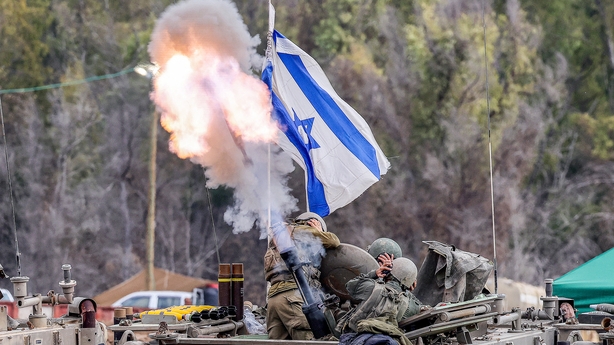US Secretary of State Antony Blinken is due to depart for a week of diplomacy on Israel's war in Gaza, visiting Israel and the West Bank, according to a State Department spokesperson.
Mr Blinken will also visit Turkey, Greece, Jordan, Qatar, the United Arab Emirates, Saudi Arabia and Egypt during his travels.
The visit comes amid heightened concerns the nearly three-month-old conflict is spreading beyond Gaza, drawing in the Israeli-occupied West Bank, Hezbollah forces on the Lebanon-Israel border, and Red Sea shipping lanes.
This will be the US Secretary of State's fourth trip to the region since the start of Israel's war against Hamas in Gaza.
Mr Blinken will discuss specific steps parties in the region can take to prevent the conflict from expanding, spokesperson Matthew Miller said at a regular press briefing.
"It is in no one's interest - not Israel's, not the region's, not the world's - for this conflict to spread beyond Gaza," he said.
Mr Blinken would also discuss immediate measures to increase humanitarian assistance to Gaza and efforts to bring home remaining hostages taken by Hamas, Mr Miller added.
The so-called Islamic State group has claimed responsibility for the attacks.

In a visit to the Lebanese border yesterday, where Israeli forces have regularly traded fire with Iran-backed Hezbollah, Israeli army chief Herzi Halevi said troops were "in very high readiness".
Hostilities also threatened to expand to Yemen after the United States and its allies jointly warned the country's Houthi rebels of unspecified consequences unless they immediately halted attacks on Red Sea shipping carried out in solidarity with Hamas.
"I would not anticipate another warning," a senior US official said, calling the message "very clear".
Ireland's 'vital interest' that Irish troops stay in Lebanon
UN peacekeeping forces in Lebanon yesterday warned that increased hostilities could prove to have "devastating consequences".
There are currently 353 Irish personnel serving as part of the United Nations Interim Force in Lebanon (UNIFIL).
This morning, Independent TD for Kildare South Cathal Berry said it is in Ireland's "vital interest" that Irish troops stay in Lebanon to prevent the regional war from escalating.
Mr Berry, who is a former army ranger, said that of the 10,000 troops that form UNIFIL, Ireland "provides the cornerstone" of that deployment.
While he acknowledged that the situation in Lebanon is currently very tense and volatile, he said Irish troops know the ground well and are very experienced.
He told RTÉ's Today with Claire Byrne: "They have been there for three decades at this stage. They have the right skillset, the right mindset and protection.
"At the moment there is a lot of tit for tat, exchanges of fire between Hezbollah and Israel.
"And the job for our troops out there is to prevent that tit for tat from getting any worse and heading to open conflict, what we don't want."

Mr Berry reflected on the 1980s when there was an Israeli invasion of Lebanon and Irish troops "stayed in place".
He also sought to reassure the families of the peacekeepers, saying they are a high performance team with a culture of excellence.
"The troops out there are very well protected, highly experienced, highly trained and are exactly where they should be right now," he added.
Fianna Fáil TD Willie O'Dea said he is certain that the Irish government would be appealing to both sides to de-escalate.
He also said the Government has a duty of care to Irish troops in Lebanon.
He said while there is the danger of escalation if one side crosses the border, one must remember over 40 countries are participating in UNIFIL and he presumes all the participating nations would be involved in any considerations.
The war against Hamas in Gaza was triggered by its 7 October attack on Israel, which resulted in the death of around 1,140 people, most of them civilians, according to an AFP tally based on official Israeli figures.
Fighters also took around 250 hostages back to Hamas-run Gaza, 129 of whom remain in captivity, according to Israel.
In response, Israel vowed to destroy the group, launching a relentless bombardment and ground invasion that has reduced swathes of Gaza to rubble and claimed at least 22,313 lives, according to the territory's Hamas-run health ministry.
The United Nations estimates 1.9 million Gazans are displaced, and the World Health Organization has warned of the risk of famine and disease, with only a minimal amount of aid entering the territory.

